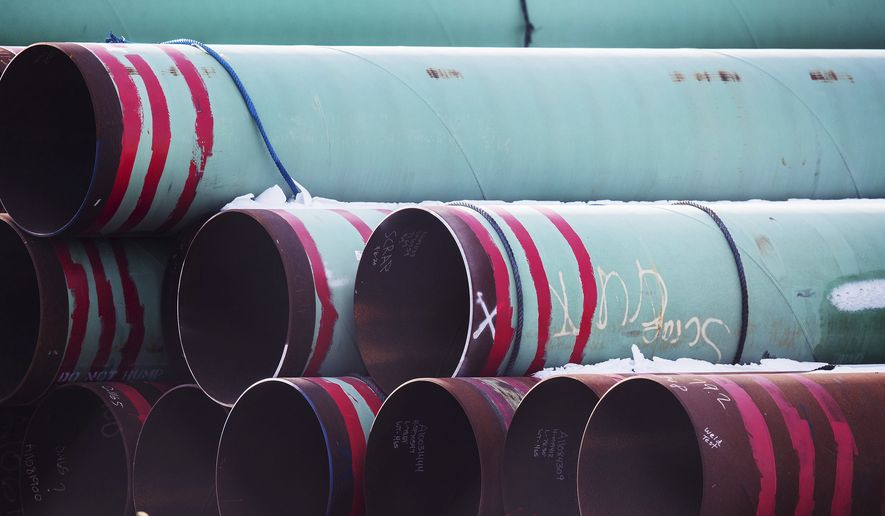Clothing manufacturer Patagonia joined pipeline opponents in celebrating the cancellation of the Keystone XL oil pipeline, even though the outdoor-apparel maker’s product line heavily relies on petroleum.
In a Thursday post, Patagonia retweeted a message from the Native Organizers Alliance declaring that the “#KXL Pipeline is DONE,” referring to TC Energy’s decision Wednesday to abandon the 1,700-mile U.S.-Canada project after a 13-year battle.
“A big congratulations to all!” Patagonia tweeted. “’The termination of this zombie pipeline sets precedent for President Biden and polluters to stop Line 3, Dakota Access, and all fossil fuel projects,’ Kendall Mackey, campaign manager of http://350.org’s Keep It in the Ground campaign.”
Patagonia also retweeted a post from the Indigenous Environmental Network, one of the company’s environmental grantees, declaring that “we have finally defeated an oil and gas giant! Keystone XL is DEAD!”
California-based Patagonia has long opposed Keystone, decrying President Trump’s 2017 decision to approve the U.S.-Canada cross-border permit and thanking President Biden for canceling it in January, even though the firm’s jackets, backpacks and gear are made with nylon, polyester and other petroleum-based fibers.
A big congratulations to all! “The termination of this zombie pipeline sets precedent for President Biden and polluters to stop Line 3, Dakota Access, and all fossil fuel projects,” Kendall Mackey, campaign manager of https://t.co/pMHfI2cNCp’s Keep It in the Ground campaign. https://t.co/YtfXzDhlwd
— Patagonia (@patagonia) June 10, 2021
Kathleen Sgamma, president of the Western Energy Alliance, described Patagonia as “a company that wants to pretend it uses no oil, yet just about every one of its products contains petroleum.”
“They couldn’t manufacture their products without oil and natural gas, and neither could their products get to customers or their customers to the trails,” she said in an email.
The message comes as woke companies come under scrutiny for their fossil-fuel usage. Last year, the North Face came under fire for refusing to fill a jacket order for a drilling services firm in Houston.
SEE ALSO: North Face honored as faithful oil-and-gas customer by Louisiana legislature
Chris Wright, president of Liberty Oilfield Services in Denver, responded last week with a billboard and social media campaign “thanking” North Face for being “an extraordinary customer of the oil-and-gas industry.”
He said that 60% of all clothing fibers globally are made of oil and gas, but that he was unable to find a single product in the North Face catalog without a petroleum component.
WATCH: North Face refused to make jackets for an oil and gas company.
— Andrew Clark (@AndrewHClark) June 4, 2021
So the fossil fuel industry is fighting back with a new campaign “thanking” North Face for using so much petroleum in their products.
Watch the 1 minute explainer ⬇️ #ThankYouNorthFace pic.twitter.com/cGcz9lUj3q
When it comes to climate activism, however, few companies can hang with Patagonia, which said it provided financial support last year to 1,020 environmental groups, including Honor the Earth and 350.org, as part of its Patagonia Action Works campaign.
Patagonia even sells a T-shirt with the message “Ditch the Drill: We Can’t Afford Another Spill.”
Unlike many corporations, however, Patagonia appears to acknowledge the disconnect between its product line and its environmental activism.
Patagonia has sought to mitigate its carbon footprint by using recycled plastics in its products, saying that “64% of our fabrics this season are made with recycled materials,” with a goal of 100% renewable and recycled raw materials, and that 100% of its U.S. electricity use came from renewable sources.
Last year, the company adopted the mission statement “we’re in business to save the home planet.”
“Patagonia is one of the most progressive marketers and distributors of outdoor clothing in the U.S and beyond,” said the announcement. “The business model of this company is impressive especially in how it targets its customers through affordable pricing of its products.”
Larry Behrens, Western states director of Power the Future, disagreed, pointing to Patagonia’s Grace VII Down Parka jacket, priced at a cool $899.
“Corporate hypocrisy is never a good look, but it’s even worse from a company like Patagonia celebrates the destruction of American blue-collar jobs and then has the arrogance to sell a jacket for $900,” said Mr. Behrens. “The fact of the matter is companies like Patagonia rely on oil for their business no matter how much they cuddle up to radical environmentalists.”
Keystone XL was intended to move about 830,000 barrels of crude oil daily from Alberta to an existing pipeline hook-up in Steele City, Nebraska, creating an estimated 42,000 jobs and $2 billion in associated U.S. earnings.
While foes cite the environmental dangers from leaks or spills, Keystone supporters argued that pipelines are far more environmentally friendly than the alternatives, such as railroads, trucks and ships.
“Keystone would have safely transported oil produced in Canada and America, so Patagonia is cheering the production of oil from countries where it’s not produced under strict environmental controls and with respect for human rights,” said Ms. Sgamma. “Bravo Patagonia.”
• Valerie Richardson can be reached at vrichardson@washingtontimes.com.




Please read our comment policy before commenting.